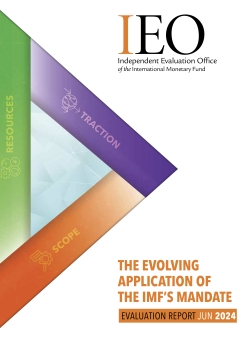
The Evolving Application of the IMF's Mandate
The application and the scope of the Fund’s mandate were consistent with its legal framework and there was a consensus across the membership that both the traditional core policies, as well as the newer policy areas were relevant and reflected important needs and priorities for the Fund’s membership in the context of a rapidly changing world economic order, characterized by increased multipolarity and shocks. However, views differed on the degree of preference among the newer policy areas and on the role of the Fund in five specific policy areas that resulted in Fund strategies, i.e., governance, social spending, digital money, climate, and gender. Further, these strategies were established through relatively condensed and ad hoc processes, which have created a number of operational challenges.
This report assesses the Fund’s decision-making process, its principles for engagement, and its engagement with partners related to newer policy areas using seven evaluation criteria: inclusiveness, transparency, comprehensiveness, coherence, clarity, flexibility, and consistency.
